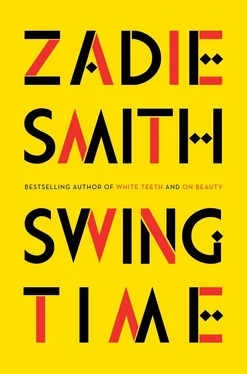“She sings fine!”
“Jesus, why are you shouting at me?”
We sat through the second half as silent as we had been in the first but this time the silence had a new texture, chilled with the iciness of mutual contempt. I longed to get out of there. Long stretches of the show passed without any sign of Tracey and held no interest for me. Only toward the end did the chorus reappear, this time as the “Dahomey Dancers,” that is, as Africans, from the Kingdom of Dahomey, they were supposedly performing at the 1893 Chicago World’s Fair. I watched Tracey in the circle of women — the men danced opposite, in their own circle — swinging her arms, crouching low and singing in a fictional African tongue, while the men stamped their feet and banged their spears in reply: gunga, hungo, bunga, gooba! I thought unavoidably of my mother, and of her line in Dahomey stories: the proud history of the kings; the shape and feel of the cowrie shells, used as money, the Amazon battalion, made up solely of women, taking prisoners of war as slaves for the kingdom, or else simply severing their enemies’ heads and holding them up in their hands. The way other children hear tell of Red Riding Hood and Goldilocks, I heard of this “Black Sparta,” the noble kingdom of Dahomey, fighting to hold off the French to the very end. But it was almost impossible to reconcile these memories with the farce presently happening, both on stage and off, for most of the people I sat among did not know what came next in the show and consequently, I realized, they felt they were watching some kind of shameful minstrel show and were willing the scene to end. On stage, too, the “audience” at the world’s fair backed away from the Dahomey Dancers, though not out of shame but their own sense of fear, that these dancers were perhaps vicious, no different from the rest of their tribe, their spears not props but weapons. I looked over at Kramer; he was squirming. I turned back and watched Tracey. What great fun she was having with the general discomfort, just as she had always enjoyed such moments as a child. She waved her spear and roared, marching with the rest, toward the fearful audience at the fair, and then laughed with the others as their audience ran off stage. Left to their own devices, the Dahomey Dancers cut loose: they sang of how glad and tired they were, glad to see the back of the white folks, and tired, so tired, of being in a “Dahomey show.”
And now the audience — the real audience — understood. They saw that what they were watching was intended to be funny, ironic, that these were American dancers, not Africans — yes, finally they grasped that a trick had been played on them. These folks weren’t from Dahomey at all! They were just good old Negroes, after all, straight from Avenue A, in New York City itself! Kramer chuckled, the music turned to ragtime, and I felt my feet moving beneath me, trying to echo on the plush red carpet the complicated soft-shoe shuffle Tracey was performing right above me on the hard-wood stage. The steps were familiar to me — they would have been to any dancer — and I wished I was up there with her. I was stuck in London, in the year 2005, but Tracey was in Chicago in 1893, and Dahomey a hundred years before that, and anywhere and any time that people have moved their feet like that. I was so jealous I cried.
• • •
Show over, I came out of the long queue for the ladies and spotted Kramer before he saw me, he was standing in the lobby, bored and angry, holding my coat over his arm. Outside it had started to lash with rain.
“So, I’m gonna go,” he said, passing me my coat, barely able to look at me. ‘I’m sure you’ll want to go say hello to your ‘friend.’”
He turned his collar up and walked into that horrible evening, umbrella-less, still angry. Nothing offends a man so much as being ignored. But I was impressed: his dislike of me was so clearly stronger than any fear of my influence over his employer. Once he was out of sight I walked around to the side of the theater and found it was just as you always see it in the old movies: the door said “Stage Door” and there was a reasonable crowd of people waiting for the cast to emerge, despite the rain, clutching their little notepads and pens.
With no umbrella, I pressed against the side of the wall, facing out, just covered by a narrow awning. I didn’t know what I planned to say or how I was going to approach her, but I was just beginning to think about it when a car pulled up in the alleyway, driven by Tracey’s mother. She was hardly changed: through the rain-streaked windscreen I could see the same tin hoops in her ears, the triple chin, hair scraped back tight, a cigarette hanging from her mouth. I turned at once to the wall and, as she parked, made my escape. I ran down Shaftesbury Avenue, getting soaked, thinking about what I’d seen in the back of that car: two sleeping young children, strapped in their seats. I wondered whether this, and nothing else, was the true reason the story of Tracey’s life took so little time to read.
Two
You want to believe there are limits to what money can make happen, lines it can’t cross. Lamin in that white suit in the Rainbow Room felt like an example of the opposite lesson. But in fact he didn’t have a visa, not yet. He had a new passport and a date of return. And when it was time to leave I would accompany him back to the village, along with Fern, staying on a week to complete the yearly report for the board of the foundation. After which Fern would remain, and I’d fly to London, to meet the children and supervise their quarterly visit to their fathers. So we were informed by Judy. Until then, a month together in New York.
For the past decade, whenever we were in the city, my base had been the maid’s room, on the ground floor off the kitchen, although occasionally a half-hearted discussion would take place about the possibility of a separate space — a hotel, a rental somewhere — which never led to anything and was soon forgotten. But this time an apartment had been rented for me before I even arrived, a two-bedroom on West 10th Street, high ceilings, fireplaces, the whole second floor of a beautiful brownstone. Emma Lazarus had once lived here: a blue plaque under my window memorialized her huddled masses, yearning to breathe free. My view was of a pink-blush dogwood in full bloom. I mistook all this for an upgrade. Then Lamin appeared and I understood I’d been moved out so he could move in.
• • •
“What exactly is going on with you?” Judy asked me, the morning after Jay’s birthday party. No preliminaries, just her strident yell coming at me through my phone as I tried to tell the bodega guy on Mercer to skip the apple in my green juice. “Have you had some kind of argument with Fernando? Because we just can’t have him in the house right now — there’s no room for him at the inn. We’ve got a full inn, as you probably noticed. Our lovebirds want their privacy. The plan was meant to be he’d stay with you for a few weeks, in the apartment, it was all settled — now suddenly he’s resistant.”
“Well, I wouldn’t know anything about that. Because nobody told me. Judy, you didn’t even mention to me that Fern was coming to New York!”
Judy made a sound of impatience: “Look, it was something Aimee wanted me to handle. It had to do with accompanying Lamin over here, she didn’t want it out in the world… It was delicate, and I handled it.”
“Do you handle who I live with too now?”
“Oh, love, I’m sorry —are you paying rent?”
I managed to get her off the phone and called Fern. He was in a taxi somewhere on the West Side Highway. I could hear the foghorn of a cruise ship docking.
Читать дальше












